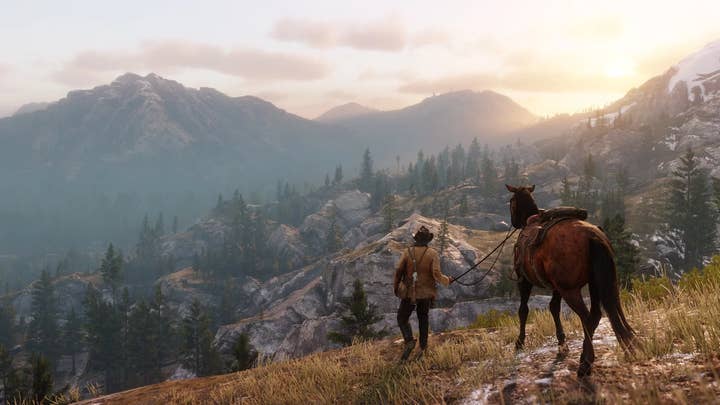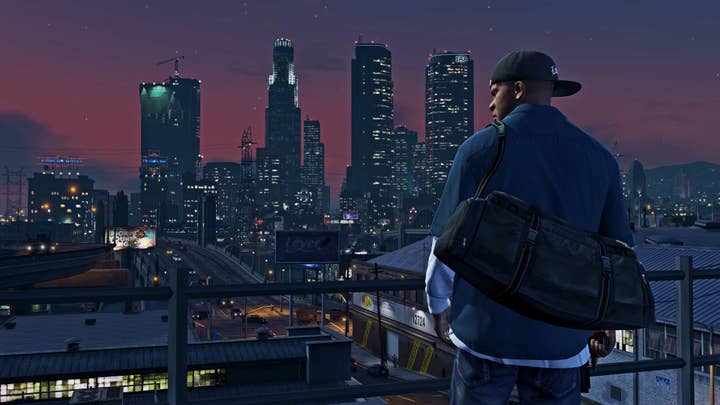Coming out from under Grand Theft Auto's shadow
For years, Take-Two's other games have lingered in the shadow of Rockstar's series, but GTA V's monumental status means it's pointless to compare it to the upcoming Red Dead Redemption 2
It must be slightly surreal being Take Two CEO Strauss Zelnick at the moment.
His company is putting the final touches on a game which will, beyond a shadow of a doubt, be one of the biggest launches of recent years - a game so anticipated that even monster franchises like Ubisoft's Assassin's Creed and Activision's Call of Duty have shuffled their release dates to avoid its arrival.
Yet much of Zelnick's job at present seems to be not singing from the rafters about this forthcoming triumph, but dampening down expectations. As the whole world gets caught up in the hype for Red Dead Redemption 2, Take Two and its CEO wrestle with trying to balance that hype - which it wants - with the fear of investors and markets getting carried away in their expectations - which it most certainly does not want.
That's the nature of being a publicly traded company, of course; a big part of the CEO's job is managing expectations. For Take Two right now, that's a tougher job than usual. Ordinarily a company can set expectations to a fairly significant extent through its own quarterly and annual projections - though these may be derailed somewhat if analysts pitch in with a consensus that's markedly different.
In Take Two's case, though, there's something absolutely enormous hanging over Red Dead Redemption 2 - namely the shadow of GTA V. Every statement made in public about the commercial side of the game seems carefully tuned to do one thing; defuse and defang the slightest notion that RDR2 is being set up as the "next GTA V".

If Take Two seems pretty good at striking this balance in its messaging, well, that's unsurprising; it's had decades of practice. After GTA 3 boosted the franchise into the stratosphere back in 2001, Take Two spent about a decade fighting against the industry perception that it was simply the "Grand Theft Auto company" - with every other franchise it worked so hard to build being merely a "snack between GTAs". The success of GTA overshadowed everything else Take Two worked on; sure, none of those other franchises were on the same level as GTA, but pretty much nothing else in the whole industry was.
"For Take Two, GTA has been a decades-long blessing, but it has at times also been a source of extreme difficulty"
The comparisons were unfair, but they were unavoidable - not least because the hit-driven nature of the industry meant that Take Two's financial results were notoriously uneven, spiking dramatically at the launch of a GTA title and collapsing when there was nothing new from Rockstar North on the release sheet.
During that time, plenty of games were lauded as being potentially "the next GTA" - a plaudit which none of them lived up to. The GTA franchise itself continued to successfully bottle lightning on almost every outing, but for both Take Two and its rivals, building something that duplicated that recipe for success on a different platform turned out to be impossibly challenging. For Take Two, of course, GTA has been a decades-long blessing; but there's no doubt that for those tasked with managing the company's relationships with investors and the markets, it has at times also been a source of extreme difficulty.
While the challenge Take Two faces with Red Dead Redemption 2 is certainly reminiscent of the problems it had during the 2000s, though, the contrast between the two eras is also very striking. It's not that the issue has gone away, though; rather it's that the gap between GTA and other franchises has grown so large, to almost a ridiculous degree, that it may have incidentally fixed Take Two's expectation management problem along the way.

GTA V is a truly monstrous game from a commercial standpoint; it is the only game in the history of the medium to dominate sales over such a period of time and across so many platforms. While I've speculated in the past that it may be the first in a wave of "evergreen games" that are simply seen as must-haves for everyone coming into the medium - a gaming equivalent of my poorly explained but utterly unquenchable need to re-purchase a new version of Blade Runner every time I get a format upgrade - it's also quite likely that GTA V is simply a commercial and cultural phenomenon that will not be matched, in raw sales numbers at least, for years if not decades.
"Red Dead Redemption 2 will do fantastically in its own right; and it'll take a very naive analyst to suggest not being the 'next GTA' is any kind of failure"
Now, if that's true then it could potentially cause a future headache for Take Two - GTA VI has been given an almost impossibly high bar to cross, after all - but it alleviates the headache around every other release, for the simple reason that GTA V's performance is simply too ridiculous to stand comparison with any other franchise. Nobody in their right mind ought to talk about RDR2 or any other Take Two game in terms of being the "next GTA" at this point, because the last GTA is a commercial behemoth that nobody in their right mind expects to see equaled, much less bettered, any time soon.
Moreover, GTA V does something none of the previous games did; it changes the entire context around Take Two's business. Where previous games created revenue spikes and troughs that made investors jittery, GTA V provides an ongoing success story, not just a huge short-term hit. Red Dead doesn't have to "live up" to GTA V, because GTA V hasn't gone away; it still sells, it still generates online revenue, it's still massively popular.
Take Two can finally successfully build a narrative of their other games being additive to GTA V (and even building on its success - if they're not thinking of ways to use GT AV's online popularity to market RDR, I'd be hugely surprised), rather than needing to fill its ridiculously large shoes. No longer a snack between GTAs, its sterling efforts on other franchises can now build upon GTA's success rather than withering under the comparison.
Of course, GTA V won't be around forever - and in the long term, Take Two faces the same problem many companies with online gaming success have struggled with: namely how to bottle lightning for a second time. The team behind GTA has proven itself more than a match for that problem for almost two decades now - but the particular success of GTA Online and the gigantic ongoing sales of the game seem to have taken even them by surprise. I wouldn't bet against their ingenuity, but it's also worth acknowledging the magnitude of the task they face in contemplating any sequel or follow-up.
For now, though, it seems that Take Two has solved its "the house that GTA built" problem in the most fortuitous of ways - by having GTA become so big, such an enormous monument on the industry landscape, that it actually defies comparison.
Red Dead Redemption 2 will do fantastically in its own right; and it'll take a very naive investor or analyst to try to trot out the idea that not being the "next GTA" is any kind of failure, when the last GTA was a once-in-a-generation - maybe once-in-a-lifetime - success.
